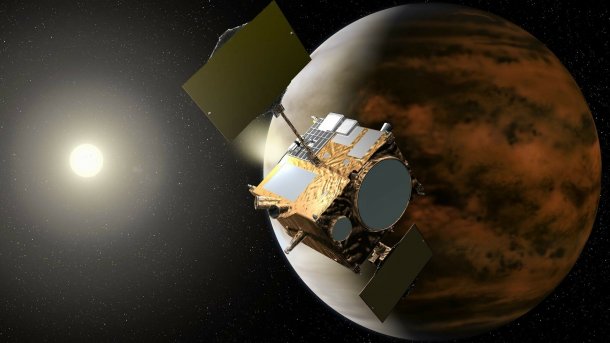Only active Venus probe: Japan has lost contact with Akatsuki
The Japanese probe Akatsuki has been orbiting Venus since 2015 [--] all by itself. Now contact has been lost. Attempts are still being made to re-establish it.

Artistic representation of Akatsuki on Venus
(Image: JAXA)
The Japanese space agency has lost contact with its Venus probe Akatsuki (あかつき). It was recently the only active research device on the second planet in our solar system. According to JAXA, there has been no contact since the end of April. However, they have not yet given up hope of being able to communicate with the probe again. The loss of contact was preceded by a longer phase in a so-called control mode, during which the accuracy of the alignment control was limited. Various measures have been used to try to re-establish contact, but so far unsuccessfully.
Extremely bumpy start to the mission
Akatsuki (Japanese for "dawn") was launched in 2010 and entered orbit around our morning star in December 2015. It completed its main mission in 2018 and has been carrying out observations ever since. Following the end of ESA's Venus Express mission, the Japanese orbiter has been the only spacecraft to maintain its position on our neighboring planet, while Mars has recently become increasingly crowded. Among other things, the probe discovered and analyzed a gigantic, arch-shaped structure in the dense atmosphere of Venus. According to the data provided, it is likely to be a so-called gravity wave, similar to those that form on mountain ranges on Earth.
Videos by heise
Akatsuki reached Venus in 2015 – five years later than originally planned. Due to a defect, the first attempt did not work. As a result, the probe only orbited the sun for years. Since the successful second attempt, the probe has come as close as 400 km. If it is actually lost now, Venus will once again have to do without an active terrestrial visitor. Only the solar probes Solar Orbiter and Parker Solar Probe from ESA and NASA regularly fly past the planet. A private mission is due to start at the end of the year, and the next ones are not scheduled for several years.
(mho)